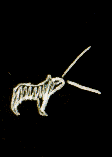
Part I

|
Part I |
Part One: Page 2
Page 1 Page 3 Page 4 Page 5
The household is a veritable hive of activity! Let's boogie on down there and see what Lucius and his wife and pets are doing. You should be able to translate these by working out what the pictures show and remembering the vocabulary that you were supposed to learn before. If the pictures just confuse you, scroll down to the vocabulary list, read it and try again.
 |  | ||
dominus stat | uxor sedet | Lucius cantat | canis latrat |
New words: Learn!
stat | stands or is standing |
Some more exciting sentences!
The sentences above are quite basic: each one contains just a noun and a verb. The four words you've just learned are verbs. No sentence is complete without a verb; and no verb is complete without a subject. The subject of a verb is the person or thing that is 'doing' its action. For example:
dominus stat
In this sentence the verb is stat. The subject of the sentence is dominus: it is the master that is doing the standing. But what if the action is being done to something else?
The dog eats the food
This sentence contains two nouns: dog and food. The subject of the sentence is 'dog': it is the dog that is doing the eating. But in this sentence there is also an object: the eating is being done to the food, so 'food' is the object of the sentence. In English the subject of a sentence appears before the verb, and the object usually appears after it.
In Latin, things are a bit different: the order of the words doesn't really matter. So how do we know what is the subject and what is the object? How would we say the above in Latin? Well, as you may be aware, 'dog' is canis; 'eats' is consumit and 'food' is cibus. So how would one say 'the dog eats the food'?
canis consumit cibus?
No! The object of the sentence should look a bit different:
canis consumit cibum
Most nouns have different subject and object forms; these different forms are known as cases, and each case looks a bit different. The subject of a sentence should be in the nominative case, while the object should be in the accusative case. There are some other cases as well, but you can forget I said that if you like.
The nominative and accusative forms of the words used in this example are:
dog | food | |
nom. | canis | cibus |
acc. | canem | cibum |
So the dog eats the food could be canis consumit cibum or canis cibum consumit or even cibum canis consumit. In all of these sentences 'canis' is nominative and 'cibum' is accusative, so we know who's doing what. The food eats the dog would be something like cibus canem consumit.
How can the accusative form be identified? If a noun ends 'um' or 'em' or 'am' (notice that there's always an 'm' at the end) then it could be in its accusative form. Some words will have one of these endings in other forms, and there are some other less common accusative endings, but for now just look out for the 'm'.
How can an accusative form be worked out? Look at these examples:
woman | master | |
nom. | femina | dominus |
acc. | feminam | dominum |
There are several different types of noun, but to keep it simple we'll stick with these two examples. If the nominative form ends 'a' then the accusative form is likely to be formed by adding an 'm' to te end; if the nominative form ends 'us' then the accusative form is likely to be formed by replacing the final 's' with an 'm'. If the nominative form has neither 'a' nor 'us' at the end, then things are a bit more complicated, so we'll come back to it later, but I'll hint now that the accusative ending will often be 'em' in such cases.
More words to learn
domina | mistress |
Exercise
Try translating these sentences. Each one contains a verb with a subject and an object. Look out for the nominative and accusative forms of the nouns. Words that you're unlikely to know yet are shown below the sentences; you don't need to learn them now.
1 dominus consumit cibum.
2 femina canem consumit.
3 domina filium laudat.
4 dominum canis spectat.
5 audit servus canem.
consumit | eats |